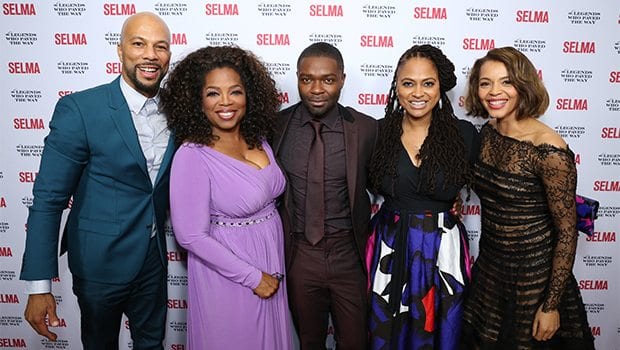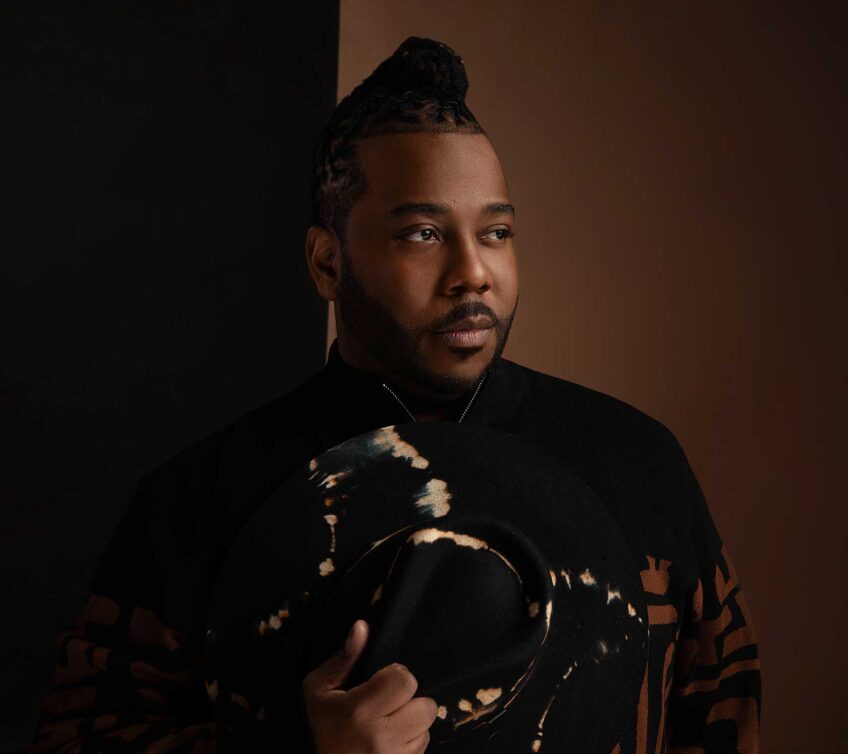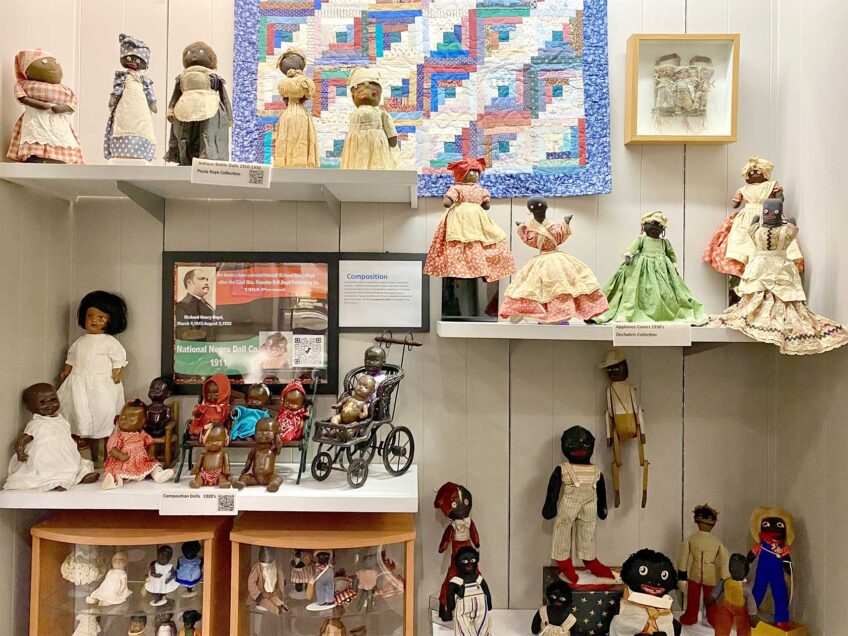
Selma, one of the most highly anticipated films of 2015, depicts a key moment in the Civil Rights Movement — the fight to secure equal voting rights for black Americans through three historic Selma-to-Montgomery, Ala., marches led by Dr. Martin Luther King Jr., the Southern Christian Leadership Conference and the Student Nonviolent Coordinating Committee in 1965. The marches ultimately paved the way for the Voting Rights Act, signed into law by President Lyndon B. Johnson in August of that year.
Directed by Ava DuVernay and starring David Oyelowo as Dr. King and Carmen Ejogo as Coretta Scott King, the film (which was also produced in part by Oprah Winfrey and Harpo Films) also brings to light the very real black women — Diane Nash, Annie Lee Cooper, Richie Jean Jackson, Amelia Boynton — who were involved both behind-the-scenes and boldly front-and-center in the marches and the movement.

David Oyelowo with director Ava DuVernay on the set of Selma.
In town recently to promote Selma, DuVernay spoke to the Banner about these unsung heroines, who fall across the spectrum of activism. Diane Nash (played by Dear White People’s Tessa Thompson) was a student leader, strategist and co-founder of SNCC. Richie Jean Jackson, who was a supporter of the movement, opened up her home as a safe haven for Dr. King, Reverends Ralph Abernathy and Hosea Williams, Andrew Jackson and James Bevel, to rest, regroup and refocus during the turbulent time.
“You have Diane Nash, who was front and center in the movement and strategy sessions,” DuVernay says. “You have Richie Jean Jackson, played by Niecy Nash, who I would argue was just as important because she created a safe space, and she fed them and she made sure they were put together and they were taken care of.”
Richie Jean Jackson’s role as caretaker was an important piece of the movement that was often overshadowed by what was taking place on the front lines.
“I think so many times when we think of women’s roles in these movements we diminish that part of it,” says DuVernay. “That part, that’s the caregiver. If he’s walking out in a wrinkled suit, hasn’t eaten and he’s sleepy, and he didn’t have a good night’s sleep, then he’s not going to be able to rally everyone in church the next day which means they don’t come. So, that does take on a great importance.”
“It was important that we reflected everyone. Annie Lee Cooper, played by Oprah Winfrey, represents that working woman. Amelia Boynton is still living — played by Lorraine Toussaint — was a local organizer. And, of course, Coretta Scott King. It was important to not just show women, but the array of roles that we had at the time.”

Director Ava DuVernay and Oprah Winfrey at Selma and the Legends Who Paved the Way special screening and gala in Santa Barbara, California.
DuVernay, who began her career as a film publicist in Los Angeles, made her feature film directing debut with the 2008 documentary This Is the Life, about LA’s hip hop movement in the ’90s. In 2010, she directed, produced and wrote her first feature film, I Will Follow, starring Omari Hardwick and Salli Richardson. I Will Follow earned a Best Screenplay award from the African-American Film Critics Association. BET also came calling that same year for her to direct the documentary My Mic Sounds Nice: The Truth About Women in Hip Hop. She also created the black film distribution company AFFRM (African American Film Festival Releasing Movement). In 2012, DuVernay directed her second film, Middle of Nowhere, which won the Best Director Prize at the Sundance Film Festival. She was the first African American woman to win the award.
DuVernay says she was hesitant about tackling Selma.
“I’m really into contemporary images of black people and I feel very activist around that stance,” she says. “I feel like the studio system is very comfortable with seeing us in hindsight and ‘what about the right now?’ and so I always say that. I’ve said that. I just directed a historical drama. That really fed into my approach because I don’t like historical dramas. I don’t like them as a viewer.”
Even though she’s not a fan of historical dramas, DuVernay couldn’t pass up this opportunity, especially with David Oyelowo, with whom she worked on Middle of Nowhere, championing her?
Oyelowo who was attached to the script since 2007, advocated for DuVernay to get the director job. David had been pitching her for the role of director with the producers before she knew that he was.
“By the time it got to me they were asking me, would I be interested in doing it? which is really astounding for a $20 million picture and a filmmaker who had done a $200,000 picture before that,” says DuVernay.
It’s all a testament to the films, the projects and the relationships DuVernay has built up over the years — not least, her relationship with Oyelowo.
“We have a great working relationship,” she says. “We believe in the same things around the importance of black cinematic images and I hope that our partnership continues.”
When asked if she had planned such a trajectory in her life, in her career, DuVernay replies, “There’s no way I planned this. All I did was stay present in the moment and work as hard as I could in the moment. It was never ‘I’m trying to get here.’ It was always, ‘This is my project now.’ I’m focused on this and that project, and that energy led to another project and another project.”
Selma opens in theaters nationwide this Friday, Jan. 9.


![Banner [Virtual] Art Gallery](https://baystatebanner.com/wp-content/uploads/2024/04/Cagen-Luse_Men-at-store-e1713991226112-150x150.jpg)

![Banner [Virtual] Art Gallery](https://baystatebanner.com/wp-content/uploads/2024/04/Cagen-Luse_Men-at-store-e1713991226112-848x569.jpg)

